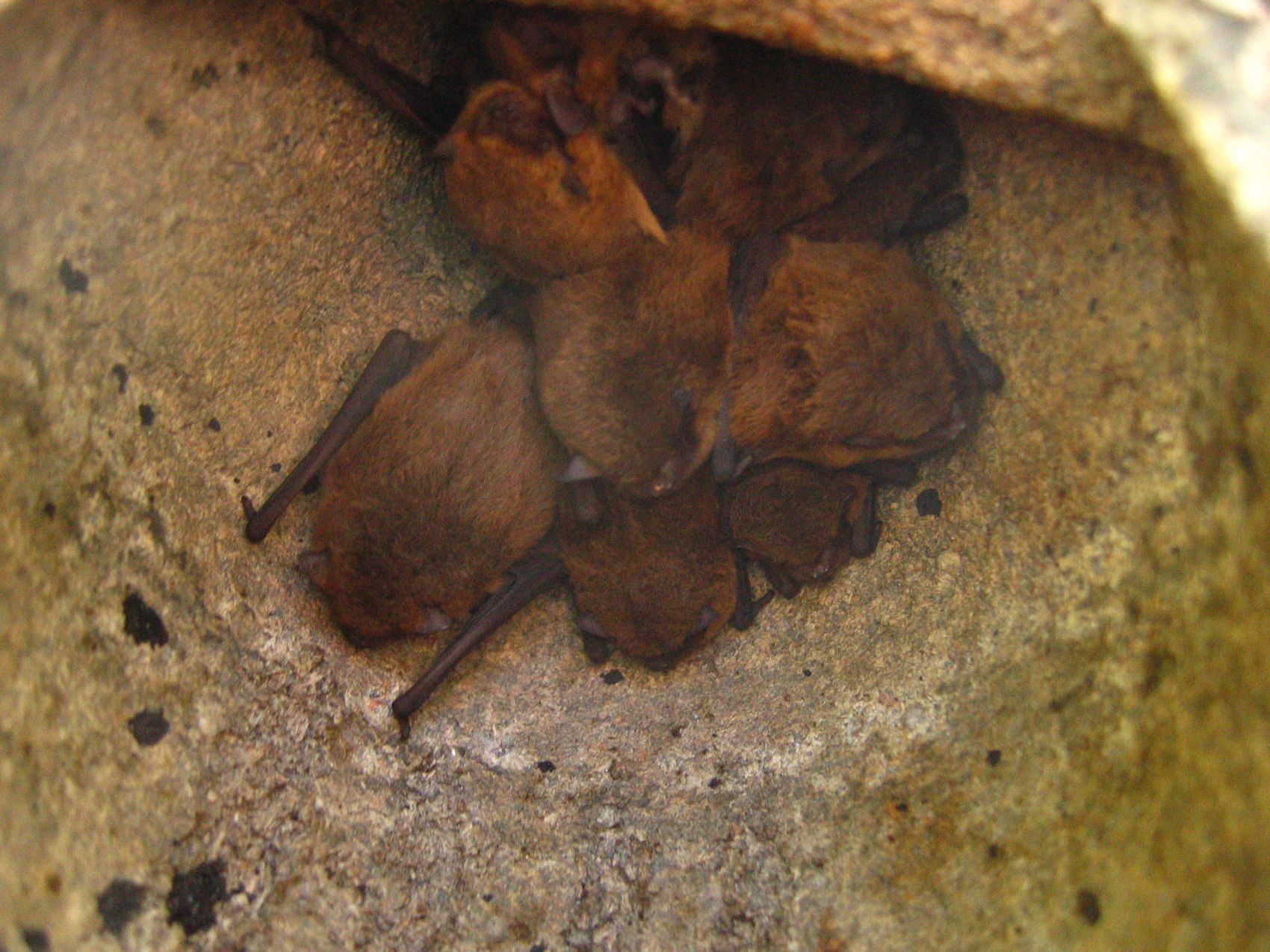VBRV Training & Training for Trainers

Common pipistrelles roosting - Steve Roe
Bat roost visiting is one of the most important activities carried out by volunteer bat workers.
It is recommended that a homeowner with a roost in their house consults the appropriate Statutory Nature Conservation Organisation (SNCO), i.e. Natural England, Nature Scot, Natural Resources Wales or Northern Ireland Environment Agency, before starting any works that may affect the bats or their roost, for example, timber treatment, roof repairs or cavity wall insulation. This ensures the bats are taken into account and avoids breaking the law.
Where relevant, the SNCO will contact a local bat roost visitor who will visit the householder. They collect information for the SNCO on the species of bat, the structure and the proposed plans, and also provide a valuable service by educating the householder about their bats.
Training as a Volunteer Bat Roost Visitor in England
To become a Volunteer Bat Roost Visitor (VBRV) in England, you must undertake a scheme of training under a licensed VBRV trainer to gain your Volunteer Bat Roost Visitor class licence (CL15).
Most bat groups have one or more trainers, who are licensed to train people to undertake all of the activities covered under the VBRV licence. The training can take approximately two years with the trainee acquiring both knowledge (e.g. bat biology and ecology) and practical experience (e.g. being able to identify whether bats are present, the species and the type of roost, giving advice on different issues, communicating effectively with the public).
The first step for anyone interested in training for this type of licence is to join your local bat group, get involved with the group's activities and projects and find out who the trainers are within the group.
The Bat Workers Manual is an essential tool for anyone training for a roost visitor licence, however for current Health & Safety instruction please see Natural England's Operational Health & Safety Guidance for VBRVs.
Training as a Licensed Trainer in England
Most bat groups have one or more trainers, who are licensed to train and sign off individuals for a VBRV level one licence (CL15). Please see the role description below.
BCT, in conjunction with Natural England, runs a Train the Trainers course when there is sufficient demand. This will be an in person weekend course as well as some pre-course sessions online. This training is funded by Natural England, for those who wish to become a licensed Volunteer Bat Roost Visitor Trainer (CL16).
The next course will take place in person at FSC Preston Montford on 8-10 March 2024 with some pre-course work online. Nominations are now open until 15 January 2024. Bat Group Committee members can make their nomination using this link.
The nomination form is the first stage in the process. Selection will be based on experience, demand and geographical location – if you are unsure about whether your experience is suitable for the course get in touch (email Naomi Webster). Further information about the process is provided in the nomination form.
Please note: the nomination form should come from a committee member on behalf of the bat group rather than the individual wishing to attend the course.
Please note that in England the trainer licence (CL16) specifically relates to the volunteer bat roost visitor class licence (CL15). Individuals can only be trained and signed off by a trainer with this licence type, in order to undertake roost visits under the Natural England homeowner advice service.
VBRV Trainer Role Description
The trainer’s role is to provide trainees with instruction and experience to ensure that they reach an adequate level of competence before they acquire their own licence. Although the onus for arranging their training rests firmly with the trainee, trainers will inevitably have to spend extra time on roost visits and other training activities. However, we hope that trainers will consider this time well spent in passing on their own experience to others and ensuring that new licence holders are able to make a useful contribution to bat work.
Qualities and abilities
- Active roost visitor holding licence WML-CL15
- Willing to work with Natural England and National Bat Helpline staff and follow relevant policies, advice and good practice guidelines
- Regularly undertakes roost visits on behalf of Natural England
- Excellent communication skills
- Diligent and reliable
- Friendly and approachable
- Capacity to balance training VBRVs with other commitments/life activities
Training as a Trainer in other parts of the UK
BCT can also run Train the Trainers courses in other parts of the UK where there is sufficient demand and funding can be sought from the appropriate SNCO. If you are interested in becoming a trainer (outside of England) please contact The Training Team.
Related content


